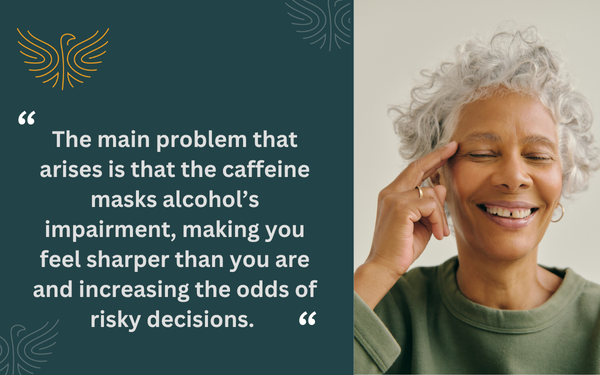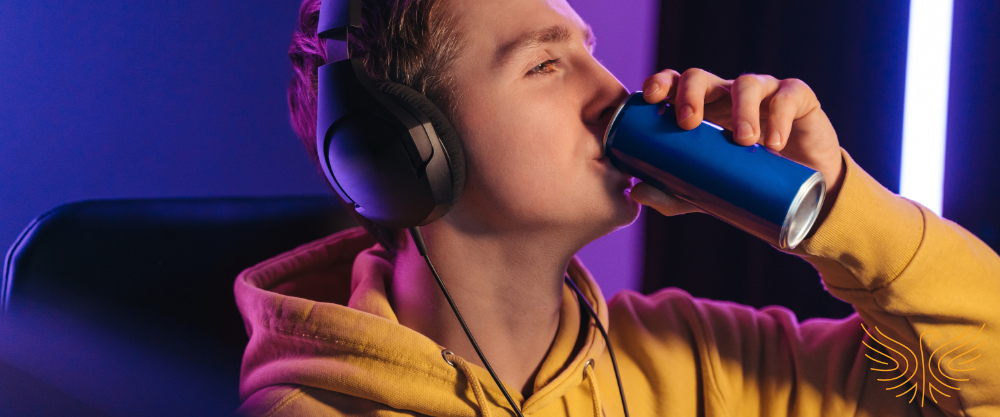From college parties to corporate happy hours, mixing alcohol with energy drinks seems like the perfect solution for staying alert while socializing. But beneath the potential upsides lies a dangerous biochemical mismatch that your body wasn’t designed to handle.
So, what should you know? Why could it potentially be dangerous mixing alcohol and energy drinks? Let’s take a closer look.
_______________________________________________________
What Happens Inside Your Body When You Combine Alcohol and Caffeine?
Alcohol acts as a central nervous system depressant1, slowing down brain function, reaction times, and coordination. Caffeine, conversely, is a powerful stimulant2 that increases alertness, heart rate, and nervous system activity.
When combined, caffeine dulls alcohol’s sedative effects3. This means you might feel wide‑awake even while your coordination, judgment, and reaction time remain dangerously impaired.
A typical vodka Red Bull contains about 80-160mg of caffeine4 (equivalent to one to two cups of coffee) mixed with one to two shots of alcohol. Popular energy drink cocktails can pack even more caffeine—up to 300mg per serving. But the main problem that arises is that the caffeine masks alcohol’s impairment, making you feel sharper than you are and increasing the odds of risky decisions.

Below, we take a closer look at the hidden dangers of mixing alcohol and energy drinks.
1. Masked Intoxication and Higher BAC Levels
It’s worth noting that caffeine doesn’t reduce your blood alcohol content5 (BAC)—it simply makes you feel less drunk. This false sense of sobriety leads many people to drink significantly more than they usually would, pushing their BAC to dangerous levels.
In fact, research shows that people who mix alcohol with energy drinks consume 36% more alcohol per drinking session than those who drink alcohol alone. The CDC has issued warnings about this phenomenon, noting that the stimulant effects can hide the warning signs your body typically sends when you’ve had too much to drink.
2. Increased Risk of Binge Drinking & Risky Behaviors
Studies reveal that mixing alcohol with energy drinks also increases the likelihood of binge drinking6. Binge drinking refers to four or more drinks for women, and five or more drinks for men on one occasion.
Additionally, this combination is potentially associated with dangerous behaviors including driving under the influence, engaging in unprotected sex, getting into physical altercations, and experiencing injuries.
3. Increased Cardiovascular Strain
Mixing stimulants and depressants places extraordinary stress on your cardiovascular system7. While alcohol initially dilates blood vessels, caffeine constricts them and increases your heart rate.
This push-pull effect forces your heart to work overtime, potentially triggering dangerous cardiac events.
Young adults and teens are particularly vulnerable, as their cardiovascular systems are still developing. However, adults with hypertension or underlying heart conditions face even greater risks. The combination can, unfortunately, lead to tachycardia (rapid heart rate), irregular heartbeats, and dangerous spikes in blood pressure.
4. Increased Risk of Dehydration & Electrolyte Imbalance
Both alcohol and caffeine act as diuretics8, increasing urine production and accelerating fluid loss. When combined, they create the perfect stage for severe dehydration.
This double-diuretic effect further intensifies hangover symptoms and can lead to dizziness, confusion, muscle cramps, and in severe cases, heat stroke or kidney problems.
5. Sleep Disruption & Mental Health
Caffeine has a half-life of five to six hours. This means that an energy drink you consume at 10 pm is still affecting your system (and your sleep) at 4 am.
Combined with alcohol’s disruptive effects on REM sleep, this creates a perfect recipe for insomnia and poor sleep quality. Your brain never gets the restorative rest it needs, leading to significant cognitive impairment the next day. Long-term, this sleep disruption contributes to anxiety, depression, and mood disorders.
_______________________________________________________
Safer Choices: Harm-Reduction Tips
The American Heart Association specifically cautions against this combination, citing increased risks of cardiac events and long-term cardiovascular damage. Despite these warnings, mixing caffeine and alcohol remains widespread. So, how can you reduce your risk?
- If you choose to consume both caffeine and alcohol, consider having your caffeine early in the day and alcohol later, allowing several hours between them.
- Always hydrate aggressively—alternating alcoholic drinks with water—and set firm limits before you start drinking.
- Explore low- or no-alcohol social alternatives that don’t require chemical enhancement to be enjoyable.
If you or someone you love is struggling with alcohol abuse, Freedom Recovery Centers (FRC) is here to help. Our treatment programs can help you or your loved one get back on track toward a healthier and fulfilling life. Contact us at 804-635-3746 to start your journey toward recovery.
.svg)






.svg)

.svg)



.svg)
